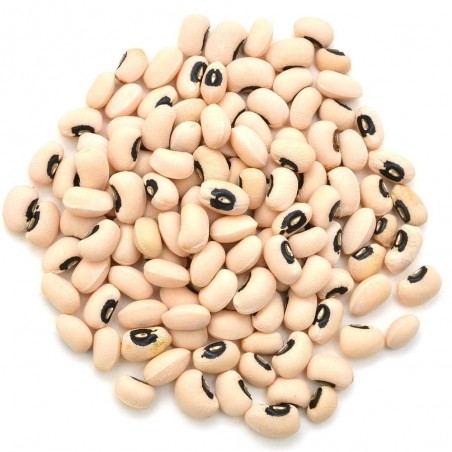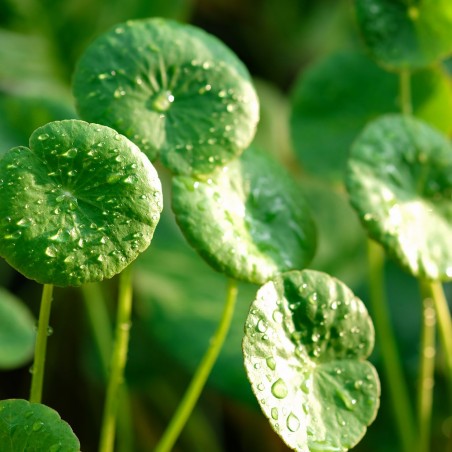
Feijoa, Pineapple Guava Seeds (Acca sellowiana)
Feijoa, Pineapple Guava Seeds (Acca sellowiana)
Price for Package of 5 seeds.
Feijoa, Pineapple Guava Seeds (Acca sellowiana)
Price for Package of 5 seeds.
Here's a shrub to show visitors to your garden - with grey-green leaves, white-felted beneath, and most attractive and rather unusual flowers with crimson and white petals and numerous prominent crimson stamens. In hot summer, these are followed by egg-sized and shaped berries that are edible, having a Guava-like flavor. However, not only are these fruits edible but the flower petals also, these having a rich, aromatic flavour. Almost hardy, but likes a warm, sunny position. Brazil.
Acca sellowiana, a species of flowering plant in the myrtle family, Myrtaceae, is native to the highlands of southern Brazil, eastern Paraguay, Uruguay, and northern Argentina, and Colombia.[1] It is widely cultivated as a garden plant and fruiting tree in New Zealand and can be found as a garden plant elsewhere such as in Australia, Azerbaijan, the West part of Georgia, South part of Russia and South Africa. [2] Common names include feijoa (pron.: /feɪˈʒoʊ.ə/, /feɪˈdʒoʊ.ə/,[3] or /feɪˈhoʊ.ə/)[4] pineapple guava and guavasteen. It is an evergreen, perennial shrub or small tree, 1–7 meters (3.3–23 ft) in height, widely cultivated as a garden plant and fruiting tree. The German botanist Otto Karl Berg named feijoa after João da Silva Feijó, a Portuguese botanist born in the colony of Brazil.
The fruit, maturing in autumn, is green, ellipsoid, and about the size of a chicken egg. It has a sweet, aromatic flavor. The flesh is juicy and is divided into a clear gelatinous seed pulp and a firmer, slightly granular, opaque flesh nearer the skin. The fruit falls to the ground when ripe and at its fullest flavor, but it may be picked from the tree prior to falling to prevent bruising.
The fruit pulp resembles the closely related guava, having a gritty texture. The feijoa pulp is used in some natural cosmetic products as an exfoliant. Feijoa fruit has a distinctive, potent smell that resembles that of a fine perfume. The aroma is due to the ester methyl benzoate and related compounds that exist in the fruit.
Growing conditions
It is a warm-temperate to subtropical plant that also will grow in the tropics, but requires at least 50 hours of winter chilling to fruit, and is frost-tolerant. When grown from seed, feijoas are noted for extremely slow growth during their first year or two, and young plants, though cold tolerant, can be very sensitive to high wind.
In the Northern Hemisphere, this species has been cultivated as far north as western Scotland, but under such conditions, it does not fruit every year, as winter temperatures below approximately −9 °C (16 °F) kill the flower buds. Summer temperatures above 90 °F (32 °C) may also have an adverse effect upon the fruit set. Feijoas are somewhat tolerant of drought and salt in soils, though fruit production can be adversely affected. Tolerant to partial shade, regular watering is essential while the fruit is maturing.
Seasonality
Large quantities of the fruit are grown in New Zealand, where it is a popular garden tree and the fruit commonly is available in season; the season runs from March to June. Feijoas are occasionally to be found as landscape plants in the far Southern United States, in regions from Texas to Florida, and southern California, though the fruit set can be unreliable in those locations. They are also grown in parts of northern California for their fruit. Fruits are an extremely rare sight away from cultivation areas, and when they can be found, they are often very, very expensive due to scarcity and demand even in places where the fruit isn't well-known.
Hardier varieties are grown in the Russian region of Buriatia (city Ulan-Ude).
Consumption and uses
The fruit usually is eaten by cutting it in half, then scooping out the pulp with a spoon.[5] The fruit has a juicy, sweet seed pulp and slightly gritty flesh nearer the skin. If the utensils needed to eat it this way are not available, the feijoa may be torn or bitten in half, and the contents squeezed out and consumed. An alternative method is to bite the end off and then tear the fruit in half lengthways, exposing a larger surface with less curvature and using one's teeth to scrape the pulp out closer to the skin. This method results in less waste of the fruit.
A feijoa may be used as an interesting addition to a fruit smoothie and may be used to make wine or cider and feijoa-infused vodka. The flavor is aromatic, very strong and complex, inviting comparison with guava, strawberry, pineapple, and often containing a faint wintergreen-like aftertaste. It also is possible to buy feijoa yogurt, fruit drinks, jam, ice cream, and such in New Zealand. It also may be cooked and used in dishes where one would use stewed fruit. It is a popular ingredient in chutney. The very strong, complex flavor can make using feijoas, in combination with other fruits or vegetables, a creative and complex undertaking.
Fruit maturity is not always apparent visually, as the fruits remain the same shade of green until they are overripe or rotting. One usually may sense ripeness, however, by giving the fruit a soft squeeze; a ripe feijoa will yield to pressure somewhat like a just-ripe banana. Generally, the fruit is at its optimum ripeness the day it drops from the tree. While still hanging, it may well prove bitter; once fallen, however, the fruit very quickly becomes overripe, so a daily collection of fallen fruit is advisable during the season.
When the fruit is immature, the seed pulp is white and opaque. It becomes clear and gelatinous when ripe. Fruits are at their optimum maturity when the seed pulp has turned into a clear jelly with no hint of browning. Once the seed pulp and surrounding flesh start to brown, the fruit is overripe, but still may be eaten, or used to make a delicious juice.
The flower petals are edible, with a flavor that is slightly sweet with hints of cinnamon. The most common use is as an addition to salads. They regularly are consumed by birds.
Feijoa is also cultivated in Azerbaijan. Besides its consumption in natural form, feijoa jam and compote is prepared and produced both in-home and on industrial scales.
Cultivation
Some grafted cultivars of feijoa are self-fertile. Most are not, and require a pollinator. Seedlings may or may not be of usable quality, and may or may not be self-fertile. Feijoas will mature into a sprawly shrub, but can be kept successfully as a large container plant, though accommodations will need to be made for the width of the plants, and the need to encourage new growth for fruit production. They can succeed in greenhouses in temperate parts of the United States, and have been grown in-ground as fruiting trees on the United States east coast in coastal Georgia and South Carolina as well as in California. Other regions of the United States: the Pacific Northwest, the southernmost Appalachian Mountains, and the immediate coastal region from North Carolina to Delaware all would warrant further investigation.
In California, robins, mockingbirds, hummingbirds, starlings, scrub jays, towhees, and grey squirrels feast on the petals and are presumed to be assisting with pollination.[citation needed] Honeybees also visit the flowers.
In the South Caucasus, feijoa was cultivated in the southern coastal region of Azerbaijan since 1928; cultivation in neighboring Georgia has gradually increased to about 988 hectares in 1986.
In New Zealand, the pollinators of this plant are bees, bumblebees, and medium-sized birds. The silvereye is a pollinator in the cooler parts of the South Island; the blackbird and the Indian myna, which feeds on the sweet, fleshy flower petals, are pollinators further north.
In some areas where the species has been introduced, however, the trees have been unproductive due to lack of pollinators. The shrub has very few insect pests.
| Organic Seeds ? | Organic Seeds |
|---|---|
| Organic/natural ? | Organic/Natural: Yes |
| Edible ? | Edible |
| Pretreatment of sowing ? | Soak in water before sowing 12-24 h |
| Sowing depth ? | Sowing depth 1 mm |
| Life Cycle: | Perennial plant : Yes |
| Handpicked seeds ? | Handpicked seeds |


Your review appreciation cannot be sent
Report comment
Report sent
Your report cannot be sent
Write your review
Review sent
Your review cannot be sent
🌍 Worldwide Shipping from the EU
We ship worldwide from the European Union using registered air post with signature confirmation on delivery.
📦 Tracking Your Order
Log in to your account and go to Order History > Details to find your tracking number.
You will receive email notifications at every step — please check your spam/junk folder if you don’t see them.
Track your package via:
⚠️ Important Notices
Cash on delivery is not available.
Always provide a valid mobile number with country code when ordering (e.g., +365 456 7686 576).
Do not order to P.O. Boxes or if you cannot be home to sign for the package. We cannot leave parcels with neighbors.
If a package sent to a P.O. Box is lost or undelivered, you lose the right to a refund.
📦 Lost, Returned & Reshipping Packages
For customers in Brazil and Mexico:
We cannot refund packages lost or destroyed by customs.
If your package is returned, we will refund only the product cost — shipping costs are not refundable.
You must pay return postage (€2) and any costs for reshipping.
If a package is returned to us for any reason, you are responsible for paying the return shipping (€2) plus the cost to resend the package.
🚚 Shipment Delivery
Registered shipments require a signature from the recipient.
If your tracking shows the package is still at the origin post office, it means the package is in transit — please contact your local post office directly for updates.
We are not responsible for delivery times and cannot track shipments for you.
📅 Delivery Options & Estimated Times
Delivery Option Processing Time Notes Priority Delivery Ships in 1-7 business days Prioritizes order processing (not guaranteed faster delivery); delays possible during holidays (3-10 days) Secured Delivery Ships in 1-7 business days Available for orders up to €150; refund if lost Standard Delivery Ships in 7-10 business days More economical; delays possible during holidays (7-14 days) Estimated Delivery Time:
Within the EU: 3–20 days
Worldwide: 5–30 days
Example delivery times to the USA:
Delivered in 13, 17, 19, 22, or 27 days.Note: Delivery times depend on your location and the local postal system. COVID-19 may cause additional delays.
💰 Shipping Costs
Shipping and handling fees are calculated automatically during checkout based on the weight of the parcel and the destination country.
⏰ Order Processing Hours
We do not process or ship orders on Saturdays or Sundays.
💳 Payment Options
Bank Transfer (SEPA / IBAN / SWIFT-BIC)
Include your order reference in the payment description (e.g., "SGS-19811702"). Orders without payment within 7 days are automatically cancelled.PayPal
Payments accepted in Euros only. Please select Euros at checkout.Card Payment
For card payments, visit our other site: Exotic Seeds Store
We accept Visa, MasterCard, American Express, CB, Diners Club, Discover, China UnionPay, JCB, and Discover.
⚠️ Transaction Fees
Customers are responsible for any transaction fees. Please provide payment details to help us process your order efficiently.
📢 Final Notes
Before placing your order, please check our website for any special notices, holiday schedules, or specific conditions that may affect your purchase.
Related Products



















